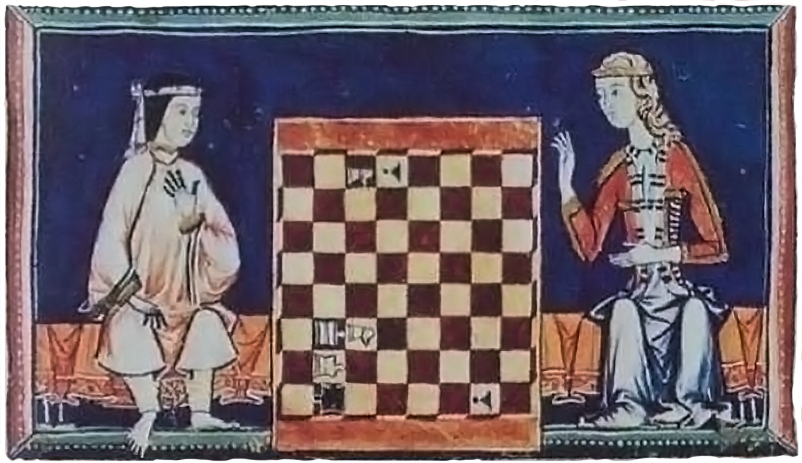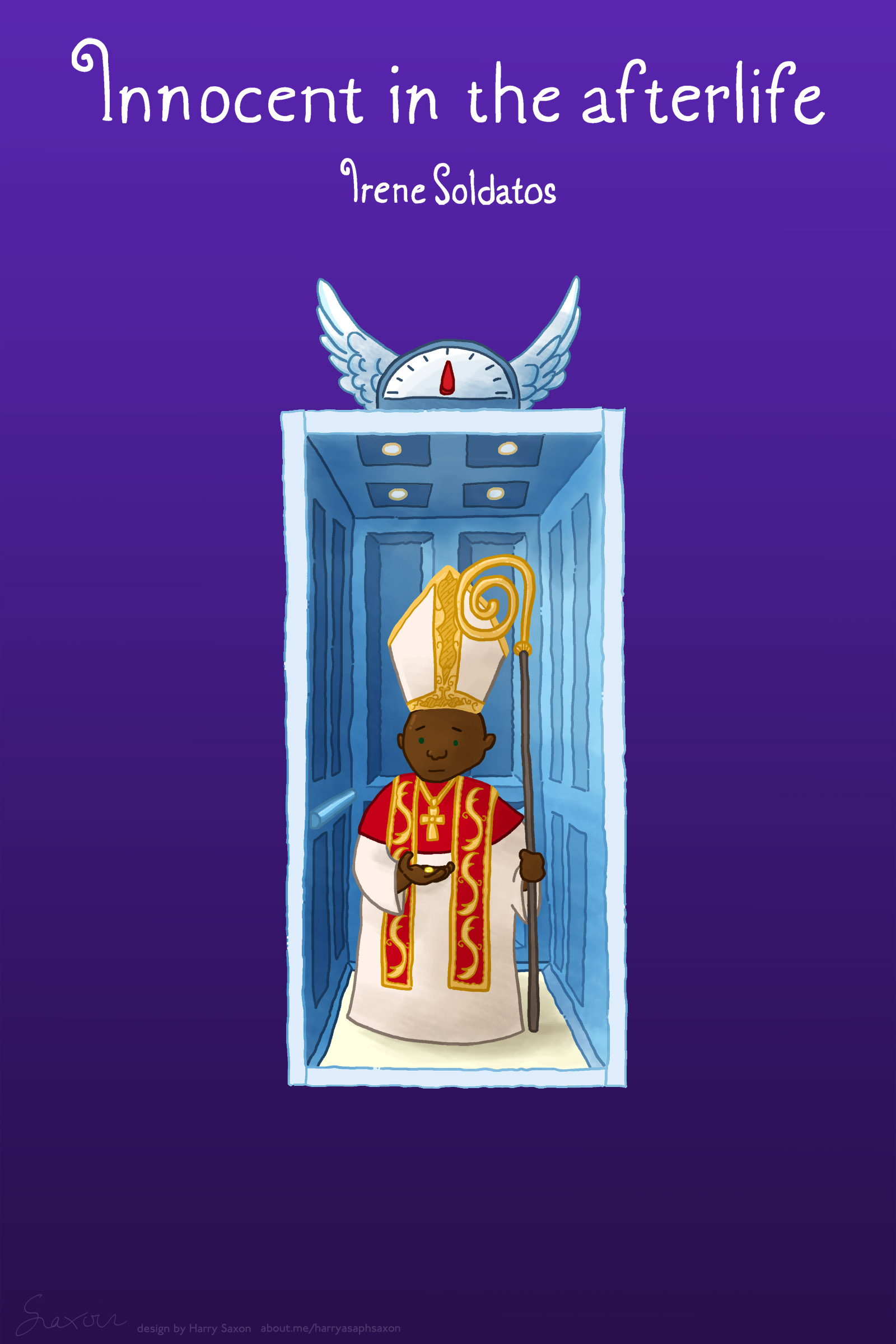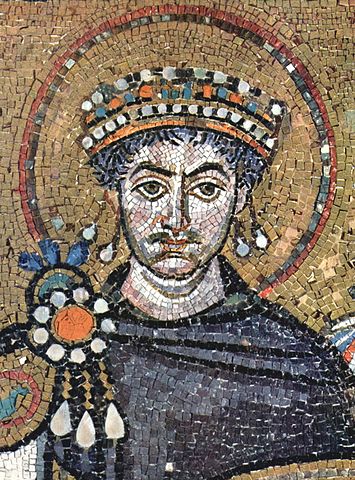
 Let us stay in the 6th century for a bit, but this time move to the East. Justinian I (c. 482 C.E. – 14 November 565 C.E.), known as The Great – which I deliberately place in inverted commas – was Byzantine Emperor from 527-565 C.E. He is considered a saint by the Easter Orthodox Church. He famously married his mistress Theodora, a professional courtesan, who became extraordinarily influential in the politics of the Empire. Justinian sought to revive the Empire’s greatness by reconquering the lost western half of the Roman Empire. He oversaw the uniform rewriting of Roman Law, the Corpus Juris Civilis, which is still the basis of civil law in many modern states. Unfortunately he also wrote many laws, and changed earlier ones; for example forbidding women from getting divorced except under very specific circumstances, whereas previously, because marriage relied on the concept of consent, women could divorce by simply not wishing to be married any more. All they needed do was send a note to their husbands informing them of the fact. Without consent, there was no marriage under earlier Roman Law. Now, a woman could divorce her husband only if one of the following reasons applied:
Let us stay in the 6th century for a bit, but this time move to the East. Justinian I (c. 482 C.E. – 14 November 565 C.E.), known as The Great – which I deliberately place in inverted commas – was Byzantine Emperor from 527-565 C.E. He is considered a saint by the Easter Orthodox Church. He famously married his mistress Theodora, a professional courtesan, who became extraordinarily influential in the politics of the Empire. Justinian sought to revive the Empire’s greatness by reconquering the lost western half of the Roman Empire. He oversaw the uniform rewriting of Roman Law, the Corpus Juris Civilis, which is still the basis of civil law in many modern states. Unfortunately he also wrote many laws, and changed earlier ones; for example forbidding women from getting divorced except under very specific circumstances, whereas previously, because marriage relied on the concept of consent, women could divorce by simply not wishing to be married any more. All they needed do was send a note to their husbands informing them of the fact. Without consent, there was no marriage under earlier Roman Law. Now, a woman could divorce her husband only if one of the following reasons applied:
- He was implicated in a plot against the government or he knew of one and did nothing about it. (Treason)
- He has attempted to kill her or did not warn her of an attempt by others.
- He seeks to deliver her to another man for the purpose of committing adultery.
- He accuses her of adultery but fails to prove his case.
- He entertained another woman in his wife’s home or he is frequently with another woman and refuses to stop after having been warned by his wife’s kinsman or “other person worthy of confidence.”
Not quite the same thing.
Also, Justinian closed Plato’s Academy in Athens, and introduced two new statutes which decreed the total destruction of paganism, even in private life. Below is the description of what these led to, by the historian Procopius.
Procopius of Caesarea (500 C.E. – c. 565 C.E.) was a contemporary of the Byzantine Emperor Justinian I. He is considered the last major historian of the ancient world. He wrote the Wars of Justinian, the Buildings of Justinian and the celebrated Secret History, from which the following excerpt is taken.
And many straight away went everywhere from place to place and compelled such persons as they met to change from their ancestral faith.1 And since such action seemed unholy to the farmer class, they all resolved to make a stand against those who brought this message. So, then, while many were being destroyed by the soldiers and many even made away with themselves, thinking in their folly that they were doing a most righteous thing, and while the majority of them, leaving their homelands, went into exile, the Montani, whose home was in Phrygia, shutting themselves up in their own sanctuaries, immediately set their churches on fire, so that they were destroyed together with the buildings in senseless fashion, and consequently the whole Roman Empire was filled with murder and with exiled men.
And when a similar law was immediately passed touching the Samaritans also, an indiscriminate confusion swept through Palestine. Now all the residents of my own Caesarea2 and of all the other cities, regarding it as a foolish thing to undergo any suffering in defence of a senseless dogma, adopted the name of Christians in place of that which they then bore and by this pretence succeeded in shaking off the danger arising from the law. And all those of their number who were persons of any prudence and reasonableness showed no reluctance about adhering loyally to this faith, but the majority, feeling resentment that, not by their own free choice, but under compulsion of the law, they had changed from the beliefs of their fathers, instantly inclined to the Manichaeans and to the Polytheists, as they are called. And all the farmers, having gathered in great numbers, decided to rise in arms against the Emperor, putting forward as their Emperor a certain brigand, Julian by name, son of Savarus. And when they engaged with the soldiers, they held out for a time, but finally they were defeated in the battle and perished along with their leader. And it is said that one hundred thousand men perished in this struggle, and the land, which is the finest in the world, became in consequence destitute of farmers. And for the owners of the land who were Christians this led to very serious consequences. For it was incumbent upon them, as a matter of compulsion, to pay to the Emperor everlastingly, even though they were deriving no income from the land, the huge annual tax, since no mercy was shown in the administration of this business.
He then carried the persecution to the “Greeks,” as they are called, torturing their bodies and looting their properties. But even those among them who had decided to espouse in word the name of Christians, seeking thus to avert their present misfortunes, these not much later were generally seized at their libations and sacrifices and other unholy acts.3
1The polytheistic religions of Greece and Rome, the adherents of which were simply called “Hellenes”, i.e. Greeks; and various Christian and Jewish sects.
2Caesarea in Palestine was the birthplace of Procopius
3Procopius: The Secret History, trans. based on H.B. Dewing, Loeb Classical Library, 1935, pp. 137-141
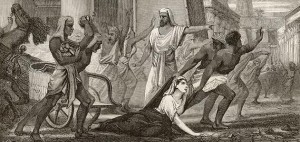
Part 3, following on from part 1 and part 2.
 Chapter XV.—Of Hypatia the Female Philosopher.
Chapter XV.—Of Hypatia the Female Philosopher.
There was a woman at Alexandria named Hypatia, daughter of the philosopher1 Theon, who made such attainments in literature and science, as to far surpass all the philosophers of her own time. Having succeeded to the school of Plato and Plotinus, she explained the principles of philosophy to her auditors, many of whom came from a distance to receive her instructions. On account of the self-possession and ease of manner, which she had acquired in consequence of the cultivation of her mind, she not unfrequently appeared in public in presence of the magistrates. Neither did she feel abashed in coming to an assembly of men. For all men on account of her extraordinary dignity and virtue admired her the more. Yet even she fell a victim to the political jealousy which at that time prevailed. For as she had frequent interviews with Orestes, it was calumniously reported among the Christian populace, that it was she who prevented Orestes from being reconciled to the bishop. Some of them therefore, hurried away by a fierce and bigoted zeal, whose ringleader was a reader named Peter, waylaid her returning home, and dragging her from her carriage, they took her to the church called Cæsareum, where they completely stripped her, and then murdered her with tiles2.After tearing her body in pieces, they took her mangled limbs to a place called Cinaron, and there burnt them. This affair brought not the least opprobrium, not only upon Cyril,but also upon the whole Alexandrian church. And surely nothing can be farther from the spirit of Christianity than the allowance of massacres, fights, and transactions of that sort. This happened in the month of March during Lent, in the fourth year of Cyril’s episcopate, under the tenth consulate of Honorius, and the sixth of Theodosius.3
1 and mathematician. He arranged Euclid’s Elements and Ptolemy’s Handy Tables.
2 Tile shards, presumably, i.e. flayed her alive with something like this.
3 Socrates and Sozomenus, Ecclesiastical Histories, ed. and trans. Philip Schaff, WM. B. Eerdmans Publishing Company, Michigan, p. 160
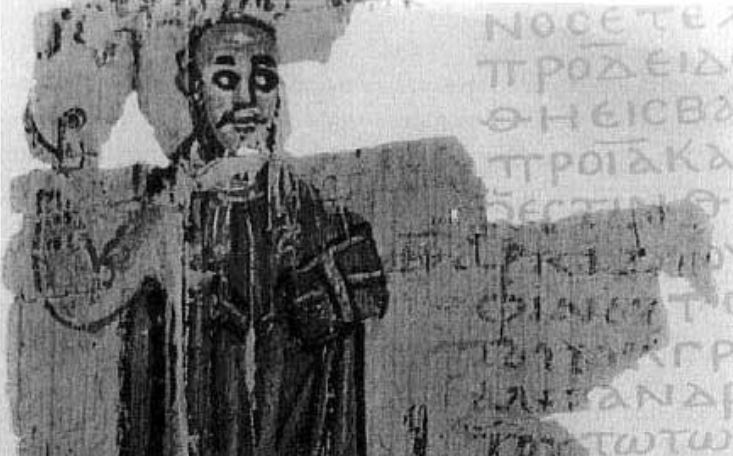
Part 2 of series of events, which began here.
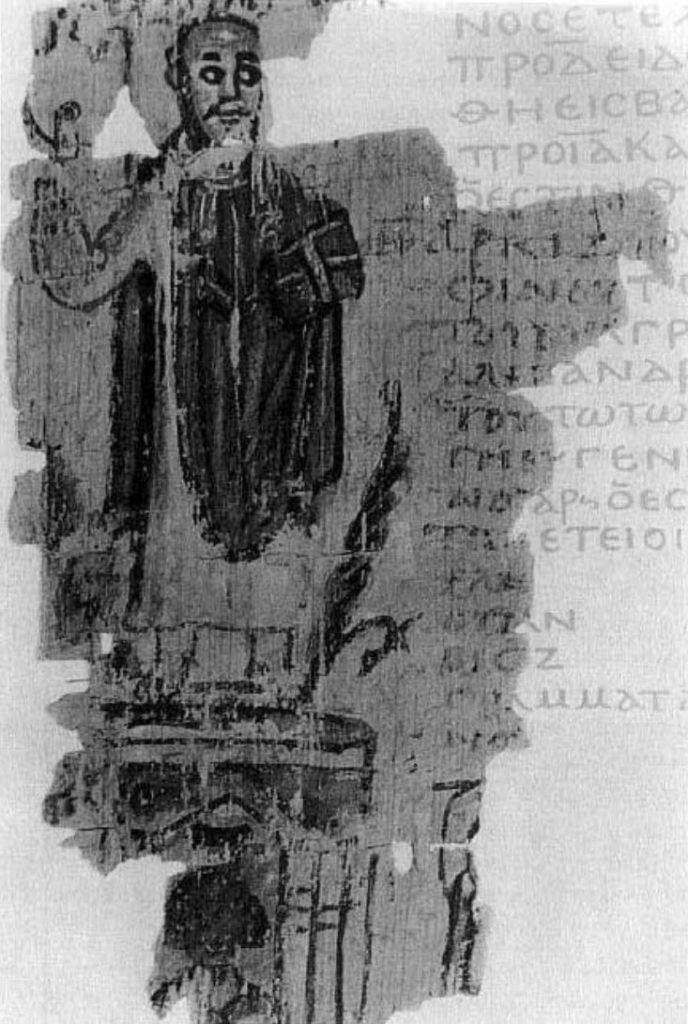
Theophilus Bishop of Alexandria with the Serapeum he destroyed
1 The previous Bishop of Alexandria, who caused the Serapeum, along with other pagan temples, to be destroyed.
2 Socrates and Sozomenus, Ecclesiastical Histories, ed. and trans. Philip Schaff, WM. B. Eerdmans Publishing Company, Michigan, p. 160
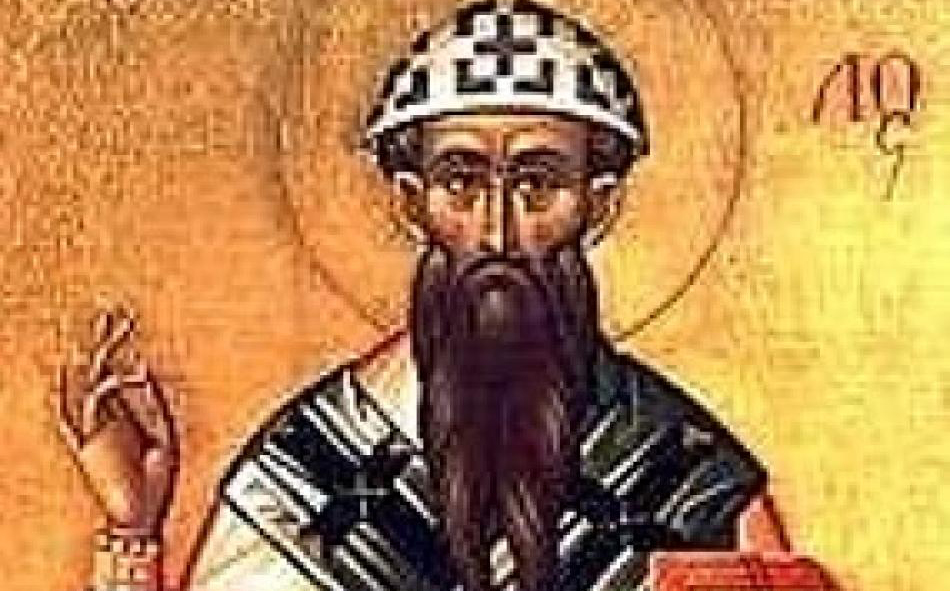
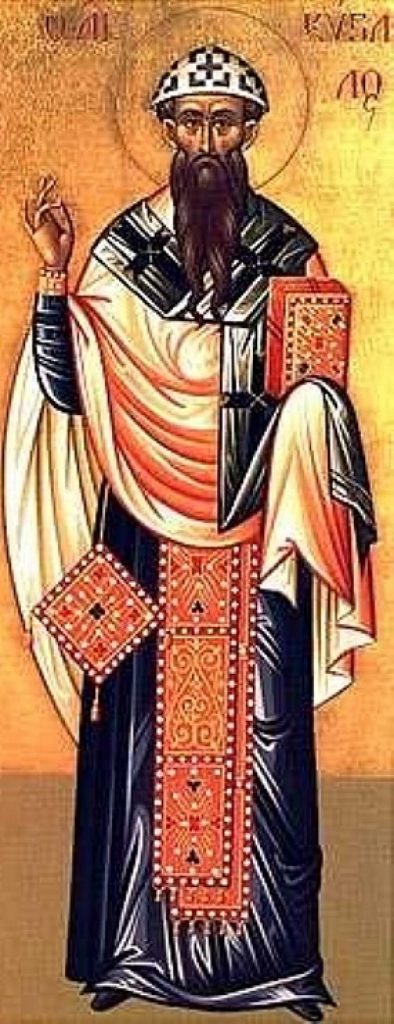
Bishop Cyril of Alexandria
This is the first of three posts all of which deal with one series of events. The series of events leading to the murder of the pagan philosopher and scientist Hypatia by a Christian mob in Alexandria in 425 C.E. She was, however, but collateral damage in a much more important struggle; that of secular versus religious authority. Nevertheless, her death sealed the victory of religious authority, since after this the Prefect, Orestes, gives up his struggle against Bishop Cyril, he gradually fades from political life, and finally disappears from historical record altogether. Where he went, what he did in later life, where, when and how he died, we don’t know.
The text is from the Christian historiographer Socrates Scholasticus’s Historia Ecclesiastica. He was born in Constantinople c. 380 C.E. and died some time after 439. The full text of Historia Ecclesiastica in English translation can be found here.
Chapter XIII.—Conflict between the Christians and Jews at Alexandria: and breach between the Bishop Cyril and the Prefect Orestes.
About this same time it happened that the Jewish inhabitants were driven out of Alexandria by Cyril the bishop on the following account. The Alexandrian public is more delighted with tumult than any other people: and if at any time it should find a pretext, breaks forth into the most intolerable excesses; for it never ceases from its turbulence without bloodshed. It happened on the present occasion that a disturbance arose among the populace, not from a cause of any serious importance, but out of an evil that has become very popular in almost all cities, viz. a fondness for dancing exhibitions.
In consequence of the Jews being disengaged from business on the Sabbath, and spending their time, not in hearing the Law, but in theatrical amusements, dancers usually collect great crowds on that day, and disorder is almost invariably produced. And although this was in some degree controlled by the governor of Alexandria, nevertheless the Jews continued opposing these measures. And although they are always hostile toward the Christians they were roused to still greater opposition against them on account of the dancers. When therefore Orestes the prefect was publishing an edict—for so they are accustomed to call public notices—in the theatre for the regulation of the shows, some of the bishop Cyril’s party were present to learn the nature of the orders about to be issued. There was among them a certain Hierax, a teacher of the rudimental branches of literature, and one who was a very enthusiastic listener of the bishop Cyril’s sermons, and made himself conspicuous by his forwardness in applauding.
When the Jews observed this person in the theatre, they immediately cried out that he had come there for no other purpose than to excite sedition among the people. Now Orestes had long regarded with jealousy the growing power of the bishops, because they encroached on the jurisdiction of the authorities appointed by the emperor, especially as Cyril wished to set spies over his proceedings; he therefore ordered Hierax to be seized, and publicly subjected him to the torture in the theatre.
Cyril, on being informed of this, sent for the principal Jews, and threatened them with the utmost severities unless they desisted from their molestation of the Christians. The Jewish populace on hearing these menaces, instead of suppressing their violence, only became more furious, and were led to form conspiracies for the destruction of the Christians; one of these was of so desperate a character as to cause their entire expulsion from Alexandria; this I shall now describe. Having agreed that each one of them should wear a ring on his finger made of the bark of a palm branch, for the sake of mutual recognition, they determined to make a nightly attack on the Christians.
They therefore sent persons into the streets to raise an outcry that the church named after Alexander was on fire. Thus many Christians on hearing this ran out, some from one direction and some from another, in great anxiety to save their church. The Jews immediately fell upon and slew them; readily distinguishing each other by their rings.
At daybreak the authors of this atrocity could not be concealed: and Cyril, accompanied by an immense crowd of people, going to their synagogues—for so they call their house of prayer—took them away from them, and drove the Jews out of the city, permitting the multitude to plunder their goods. Thus the Jews who had inhabited the city from the time of Alexander the Macedonian were expelled from it, stripped of all they possessed, and dispersed some in one direction and some in another. One of them, a physician named Adamantius, fled to Atticus bishop of Constantinople, and professing Christianity, some time afterwards returned to Alexandria and fixed his residence there.
But Orestes the governor of Alexandria was filled with great indignation at these transactions, and was excessively grieved that a city of such magnitude should have been suddenly bereft of so large a portion of its population; he therefore at once communicated the whole affair to the emperor. Cyril also wrote to him, describing the outrageous conduct of the Jews; and in the meanwhile sent persons to Orestes who should mediate concerning a reconciliation: for this the people had urged him to do. And when Orestes refused to listen to friendly advances, Cyril extended toward him the book of gospels,believing that respect for religion would induce him to lay aside his resentment. When, however, even this had no pacific effect on the prefect, but he persisted in implacable hostility against the bishop, the following event afterwards occurred.1
1Socrates and Sozomenus, Ecclesiastical Histories, ed. and trans. Philip Schaff, WM. B. Eerdmans Publishing Company, Michigan, p. 159-160
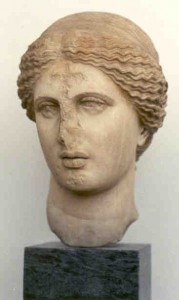

The head of a statue of Aphrodite with some Christian improvements
Libanius (ca. 314 – ca. 394 C.E.) was a Greek-speaking teacher of rhetoric of the Sophist school. Libanius was a friend of the emperor Julian II (later called The Apostate), with whom some correspondence survives, and in whose memory he wrote a series of orations; they were composed between 362 and 365. Libanius remained a pagan, though this did not stop him cultivating long-lasting friendships with Christians, both as private individuals and as imperial officials. In 386 he wrote an oration addressed to the Emperor Theodosius I, ‘complaining about gangs of monks who wandered the Syrian countryside demolishing pagan shrines and terrorizing peasants.’1 Addressing such an oration to Theodosius was a delicate, not to say dangerous thing to do, but poor Libanius, despite all evidence to the contrary, seemed to have still have harboured some hope for religious toleration if not actual freedom. In 391 Theodosius forbade on pain of prescription of property, torture and even death, the practising of any religion other than Christianity, or even visiting the temples, which he closed down, giving some of the buildings over to various bishoprics. In 386 however, he had not yet gone so far. Sacrificing was forbidden, but praying or worshipping with incense was not.
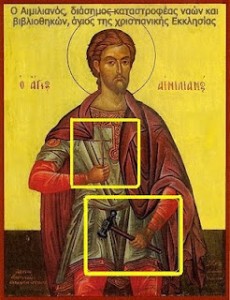
Saint Aemilianus holding the hammer he used on statues and temples
I shall, indeed, appear to many to undertake a matter full of danger in pleading with you for the temples, that they may suffer no injury, as they now do. But they who have such apprehensions seem to me to be very ignorant of your true character. For I esteem it the part of an angry and severe disposition, for any one to resent the proposal of counsel which he does not approve of: but the part of a mild and gentle and equitable disposition, such as yours2 is, barely to reject counsel not approved of. For when it is in the power of him to whom the address is made to embrace any counsel or not, it is not reasonable to refuse a hearing which can do no harm; nor yet to resent and punish the proposal of counsel, if it appear contrary to his own judgement; when the only thing that induced the adviser to mention it, was a persuasion of its usefulness.
…
After his death3 in Persia, the liberty of sacrificing remained for some tim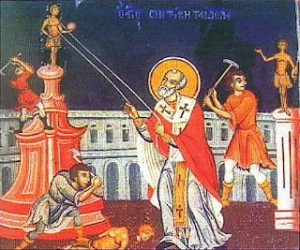 e: but at the instigation of some innovators, sacrifices were forbidden by the two brothers4, but not incense;—-which state of things your law has ratified. So that we have not more reason to be uneasy for what is denied us, than to be thankful for what is allowed. You, therefore, have not ordered the temples to be shut up, nor forbidden any to frequent them: nor have you driven from the temples or the altars, fire or frankincense, or other honours of incense. But those black-garbed people5, who eat more than elephants, and demand a large quantity of liquor from the people who send them drink for their chantings, but who hide their luxury by their pale artificial countenances,—-these men, O Emperor, even whilst your law is in force, run to the temples, bringing with them wood, and stones, and iron, and when they have not these, hands and feet. Then follows a Mysian prey6, the roofs are uncovered, walls are pulled down, images are carried off, and altars are overturned: the priests all the while must be silent upon pain of death. When they have destroyed one temple they run to another, and a third, and trophies are erected upon trophies: which are all contrary to [your] law. This is the practice in cities, but especially in the countries. And there are many enemies every where. After innumerable mischiefs have been perpetrated, the scattered multitude unites and comes together, and they require of each other an account of what they have done; and he is ashamed who cannot tell of some great injury which he has been guilty of. They, therefore, spread themselves over the country like torrents, wasting the countries together with the temples: for wherever they demolish the temple of a country, at the same time the country itself is blinded, declines, and dies.
e: but at the instigation of some innovators, sacrifices were forbidden by the two brothers4, but not incense;—-which state of things your law has ratified. So that we have not more reason to be uneasy for what is denied us, than to be thankful for what is allowed. You, therefore, have not ordered the temples to be shut up, nor forbidden any to frequent them: nor have you driven from the temples or the altars, fire or frankincense, or other honours of incense. But those black-garbed people5, who eat more than elephants, and demand a large quantity of liquor from the people who send them drink for their chantings, but who hide their luxury by their pale artificial countenances,—-these men, O Emperor, even whilst your law is in force, run to the temples, bringing with them wood, and stones, and iron, and when they have not these, hands and feet. Then follows a Mysian prey6, the roofs are uncovered, walls are pulled down, images are carried off, and altars are overturned: the priests all the while must be silent upon pain of death. When they have destroyed one temple they run to another, and a third, and trophies are erected upon trophies: which are all contrary to [your] law. This is the practice in cities, but especially in the countries. And there are many enemies every where. After innumerable mischiefs have been perpetrated, the scattered multitude unites and comes together, and they require of each other an account of what they have done; and he is ashamed who cannot tell of some great injury which he has been guilty of. They, therefore, spread themselves over the country like torrents, wasting the countries together with the temples: for wherever they demolish the temple of a country, at the same time the country itself is blinded, declines, and dies.
…
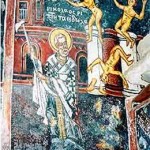
This is saint Nicholas. Yes, the same one that supposedly brings Christmas presents.
This being the state of things, the husbandman is impoverished, and the revenue suffers. For, be the will ever so good, impossibilities are not to be surmounted. Of such mischievous consequence are the arbitrary proceedings of those persons in the country, who say, ‘they fight with the temples.’ But that war is the gain of those who oppress the inhabitants: and robbing these miserable people of their goods, and what they had laid up of the fruits of the earth for their sustenance, they go off as with the spoils of those whom they have conquered. Nor are they satisfied with this, for they also seize the lands of some, saying it is sacred: and many are deprived of their paternal inheritance upon a false pretence. Thus these men riot upon other people’s misfortunes, who say they worship God with fasting. And if they who are abused come to the pastor in the city, (for so they call a man who is not one of the meekest,) complaining of the injustice that has been done |79 them, this pastor commends these, but rejects the others, as if they ought to think themselves happy that they have suffered no more. Although, O Emperor, these also are your subjects, and so much more profitable than those who injure them, as laborious men are than the idle: for they are like bees, these like drones. Moreover, if they hear of any land which has any thing that can be plundered, they cry presently, ‘Such an one sacrificeth, and does abominable things, and an army ought to be sent against him.’ And presently the reformers are there: for by this name they call their depredators, if I have not used too soft a word. Some of these strive to conceal themselves and deny their proceedings; and if you call them robbers, you affront them. Others glory and boast, and tell their exploits to those who are ignorant of them, and say they are more deserving than the husbandmen. Nevertheless, what is this but in time of peace to wage war with the husbandmen? For it by no means lessens these evils that they suffer from their countrymen. But it is really more grievous to suffer the things which I have mentioned in a time of quiet, from those who ought to assist them in a time of trouble. For you, O Emperor, in case of a war collect an army, give out orders, and do everything suitable to the emergency. And the new works which you now carry on are designed as a further |80 security against our enemies, that all may be safe in their habitations, both in the cities and in the country: and then if any enemies should attempt inroads, they may be sensible they roust suffer loss rather than gain any advantage. How is it, then, that some under your government disturb others equally under your government, and permit then not to enjoy the common benefits of it? How do they not defeat your own care and providence and labours, O Emperor? How do they not fight against your law by what they do?7
…
Good questions. Unfortunately for Libanius, and the rest of the world, (I’m with Gore Vidal on this one), Theodosius’s subsequent laws make the answers to them quite obvious.
1Gaddis, Michael, There is no crime for those who have Christ: Religious Violence in the Christian Roman Empire, University of California Press, 2005, p. 210.
2This is the emperor who, in 390, as retaliation for an uprising against the local Magister Militum, exploded in a fit of rage and ordered what is now known as the Massacre of Thessalonica, in which several thousand civilians, men, women and children were killed, indiscriminately. The lowest contemporary estimate is 7,000, the highest 15,000 dead.
3Julian II “the Apostate”.
4Emperors Valentinian and Valens.
6This proverbial expression took its rise from the Mysians, who, in the absence of their king Telepbus, being plundered by their neighbours, made no resistance. Hence it came to be applied to any persons who were passive under injuries.
7Libanius, Oration 30: For the Temples (pro Templis), in Dr Lardner’s, Heathen Testimonies, Thomas Rodd in London, 1830, pp. 72-96.

 Let us stay in the 6th century for a bit, but this time move to the East. Justinian I (c. 482 C.E. – 14 November 565 C.E.), known as The Great – which I deliberately place in inverted commas – was Byzantine Emperor from 527-565 C.E. He is considered a saint by the Easter Orthodox Church. He famously married his mistress Theodora, a professional courtesan, who became extraordinarily influential in the politics of the Empire. Justinian sought to revive the Empire’s greatness by reconquering the lost western half of the Roman Empire. He oversaw the uniform rewriting of Roman Law, the Corpus Juris Civilis, which is still the basis of civil law in many modern states. Unfortunately he also wrote many laws, and changed earlier ones; for example forbidding women from getting divorced except under very specific circumstances, whereas previously, because marriage relied on the concept of consent, women could divorce by simply not wishing to be married any more. All they needed do was send a note to their husbands informing them of the fact. Without consent, there was no marriage under earlier Roman Law. Now, a woman could divorce her husband only if one of the following reasons applied:
Let us stay in the 6th century for a bit, but this time move to the East. Justinian I (c. 482 C.E. – 14 November 565 C.E.), known as The Great – which I deliberately place in inverted commas – was Byzantine Emperor from 527-565 C.E. He is considered a saint by the Easter Orthodox Church. He famously married his mistress Theodora, a professional courtesan, who became extraordinarily influential in the politics of the Empire. Justinian sought to revive the Empire’s greatness by reconquering the lost western half of the Roman Empire. He oversaw the uniform rewriting of Roman Law, the Corpus Juris Civilis, which is still the basis of civil law in many modern states. Unfortunately he also wrote many laws, and changed earlier ones; for example forbidding women from getting divorced except under very specific circumstances, whereas previously, because marriage relied on the concept of consent, women could divorce by simply not wishing to be married any more. All they needed do was send a note to their husbands informing them of the fact. Without consent, there was no marriage under earlier Roman Law. Now, a woman could divorce her husband only if one of the following reasons applied:











